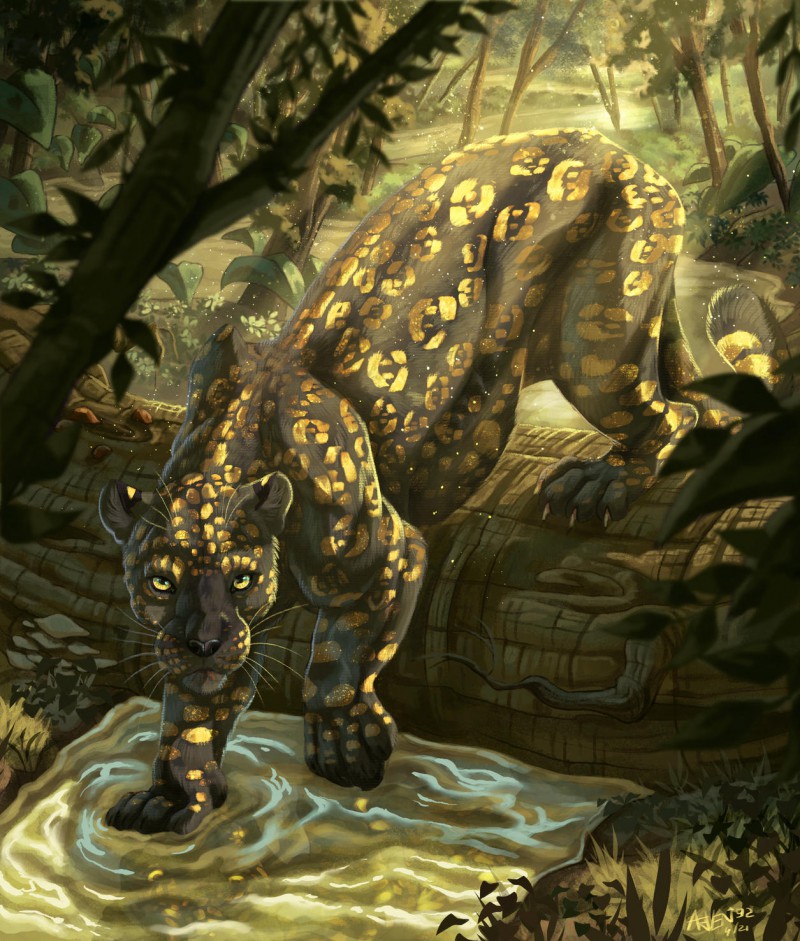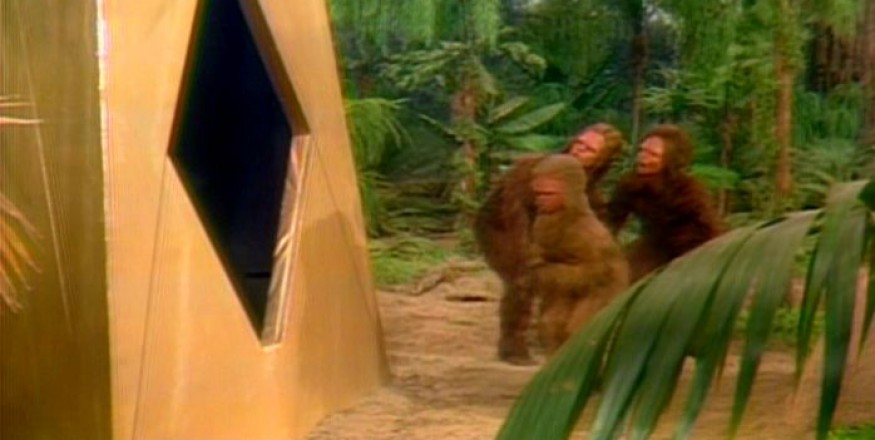 x
x
The instruments the Pylon had programmed them to use were simple enough, yet they could change this planet and make the Pakuni its masters. The most primitive was the hand-held stone that multiplied tenfold the power of a blow. Then there was the bone club that lengthened the reach and could provide a buffer against the fangs or claws of enraged animals. With these crude weapons, the limitless food that roamed the pampas was theirs for the taking. 486Please respect copyright.PENANAJlFYqKBxJl
But they needed other aides, for their teeth and nails alone could not readily dismember anything bigger than a rabbit. Fortunately, Nature had provide the ideal tools, requiring only the wit to pick them up; First there was a crude but very efficient knife or saw, of a model that would serve well for the next three million years. It was simply the lower jawbone of an antelope, with the teeth still in place; there would be no substantial improvement until the coming of steel. Then there was an awl or dagger in the form of the antelope's horn, and finally a scraping tool made from the complete jaw of any small animal.
The stone club, the toothed saw, the horn dagger, the bone scraper---these were the marvelous inventions which the Pakuni needed in order to survive. Soon they would recognize them for the symbols of power that they were, but many months must pass before their clumsy fingers had gained the skill---or the will---to use them.
Maybe, given enough time, they might by their own efforts have come to the awesome and brilliant concept of using natural weapons as artificial tools. But the cards were stacked against them, and even now there were endless opportunities for failure in the ages that lay ahead.
The Pakuni had been given their first chance. There would be no second one; the future was (literally!) in their own hands.
Moons waxed and waned; babies were born and sometimes lived; feeble, toothless 30-year-olds died; the jaguar took its toll in the night; the Others threatened daily across the river---and the tribe prospered. In the course of one year, Cha-ka and his companions had changed almost beyond recognition.
They had learned their lessons well; now they could handle all the tools that had been revealed to them. The very memory of hunger was fading from their minds; and though the warthogs were becoming shy, there were antelopes and deer and bears in countless thousands on the plains. All these animals, and others, had fallen prey to the apprentice hunters.
Now that they were no longer half-stunned by starvation, they had time both for leisure and for the first rudiments of thought. Their new way of life was now casually accepted, and they did not associate it in any way with the Pylon still standing beside the trail to the river. If they had ever stopped to consider the matter, they might've boasted that they had brought about their improved status by their own merits; in fact, they had already forgotten any other mode of existence.
But no Utopia is perfect, and this one had two serious flaws. The first was the marauding jaguar, whose appetite for the Pakuni had grown even stronger now that they were better fed. The second was the tribe across the river; for somehow the Others had survived, and had stubbornly refused to die of starvation.
The jaguar problem was resolved partly by chance, partly owing to a serious---indeed almost fatal---error on Cha-Ka's part. Yet at the time his idea had seemed such a brilliant one that he had danced with joy, and maybe he could hardly be blamed for overlooking the consequences.
The tribe still experienced occasional bad days, though these no longer threatened its very survival. Toward dusk, it had failed to make a kill; the home caves were already in sight as Cha-Ka led his tired and disgruntled companions back to shelter. And there, on their very threshold, they found one of nature's rare bonanzas. A full-grown antelope was lying by the trail, its foreleg was broken, but it still had plenty of fight left in it, and the circling gray foxes gave its daggerlike horns a wide berth. They could afford to wait; they knew that they had only to bide their time. But they had forgotten about the competition, and retreated with angry snarls when the Pakuni arrived.
They too circled warily, keeping out of the range of those lethal horns; then they moved to the attack with clubs and stones.
It was not a very effective or coordinated attack; by the time the misbegotten beast had been allowed its quietus the light had almost gone---and the gray foxes were regaining their courage. Cha-Ka, torn between fear and hunger, slowly realized that all this effort might have been in vain. It was too dangerous to stay here any longer.
Then, not for the first time or the last time, he proved himself a genius. With an immense effort of imagination, he visualized the dead antelope---in the safety of his own cave.
He started to drag it toward the cliff face; presently, the others understood his intentions and started to help him.
If he had known how difficult the task would be, he would never have attempted it. Only his great strength, and the agility inherited from his arboreal ancestors allowed him to haul the carcass up the steep slope. Several times, weeping with frustration, he almost abandoned his prize, but a stubbornness as deep-seated as his hunger drove him on. Sometimes the others helped him, sometimes they hindered; more often, they merely got in the way. But finally it was done; the battered antelope was dragged over the lip of the cave, as the last hues of sunlight faded from the sky; and the feasting began.
Hours later, gorged to repletion, Cha-Ka woke up. Not knowing why, he sat up in the darkness among the sprawled bodies of his equally satiated companions, and strained his ears into the night.
There was no sound except the heavy breathing around him; the whole world seemed asleep. The rocks beyond the mouth of the cave were pale as bone in the brilliant light from the moon, now high overhead. Any thought of danger seemed infinitely remote.
Then, from a long way off, came the sound of a falling pebble. Fearful, yet inquisitive, Cha-Ka crawled out onto the ledge of the cave and peered down the face of the cliff.
What he saw left him so paralyzed with fright that for long seconds he was not able to move. Only 20 feet below, two gleaming golden eyes were staring straight up at him; they held him so hypnotized with fear that he was barely aware of the lithe, spotted body behind them, flowing smoothly and silently from rock to rock. Never before had the jaguar climbed so high. It had ignored the lower caves, though it must have been well aware of their inhabitants. Now it was after other game; it was following the spoor of blood, up the moonlit face of the cliff.
Seconds later, the night was made hideous by the shrieks of alarm from the Pakuni in the cave above. The jaguar gave a snarl of fury as it realized that it no longer had the element of surprise. But it did not check its advance, knowing full well that had nothing to fear.
It reached the ledge, and rested for a moment on the narrow open space. The smell of blood was all around, filling its fierce and tiny brain with one overwhelming desire. Without hesitation, it padded silently into the cave.
And here it made its first error, for as it moved out of the moonlight even its superbly night-adapted eyes were at a momentary disadvantage. The Pakuni could see it, partly silhouetted against the opening of the cave, more clearly than it could see them. They were terrified, but they were no longer utterly helpless.
Snarling and lashing its tail in arrogant confidence, the jaguar advanced in search of the tender food that it craved. Had it met its prey in the open, it would have had no troubles; but now that the Pakuni were trapped, desperation had given them the courage to attempt the impossible. And for the first time they had the means to achieve it.486Please respect copyright.PENANAcA9R4Pc7ON
The leopard knew that something was amiss when it felt a stunning blow on its head. It lashed out with its forepaw, and heard a shriek of agony as its claws slashed through soft flesh. Then there was a piercing pain as something sharp drove into its flanks---once, twice, and yet a third time. It whirled around to strike at the shadows screaming and dancing all around.486Please respect copyright.PENANAOhejIiTZCy
Again there was a violent blow as something caught the beast across the snout. Its teeth snapped on a white, moving blur only to grate uselessly upon dead bone. And now---in a final, unbelievable indignity---its tail was being dragged out by the roots.486Please respect copyright.PENANAqdfJnqG3KL
It whirled around, throwing its insanely daring tormentor against the cave wall. Yet not matter what it did, it could not escape the rain of blows inflicted on it by crude weapons wielded from pain to alarm, from alarm to outright terror. The implacable hunter was now the victim, and was desperately trying to retreat.
And then it made its second mistake, for in its surprise and fright it'd forgotten where it was. Or maybe it'd been dazed or blinded by the blows rained on its head; whatever the case, it bolted abruptly from the cave. There was a horrible screech as it went toppling out into space. Ages later, it seemed, there came a thud as it crashed into an outcropping halfway down the cliff; thereafter, the only sound was the sliding of loose boulders, which quickly died away into the night.
For a long time, intoxicated by victory, Cha-Ka stood dancing and gibbering at the entrance of the cave. He rightly sensed that his whole world had changed and that he was no longer a powerless victim of the forces around him.
Then he went back into the cave and, for the first time in his life, had an uninterrupted night's sleep.
In the morning, they found the jaguar's body at the foot of the cliff. Even in death, it was some time before anyone dared to approach the vanquished monster, but presently they closed in upon it, with their bone knives and saws.
It was very hard work, and they did no hunting that day.
ns 15.158.61.40da2





















